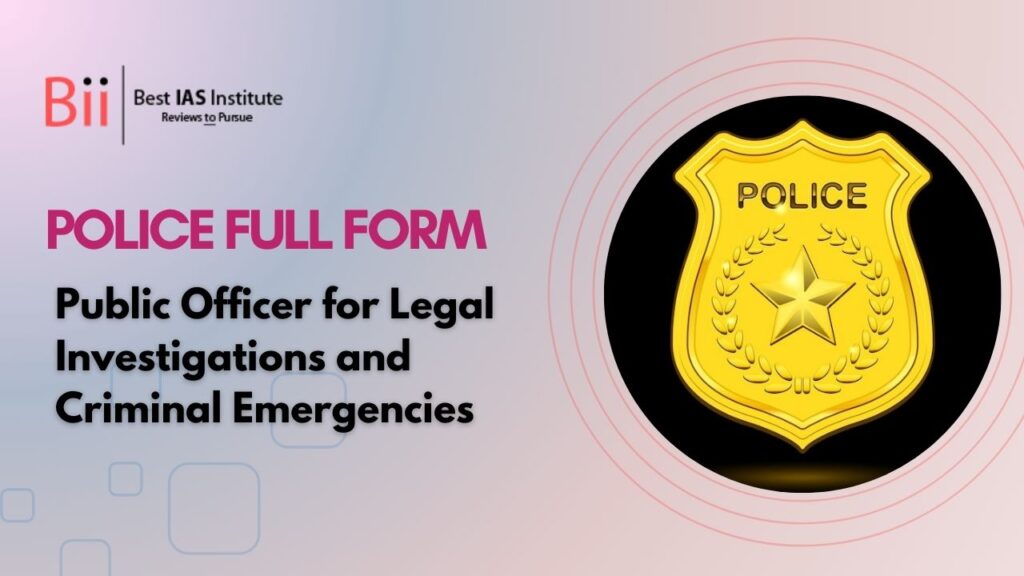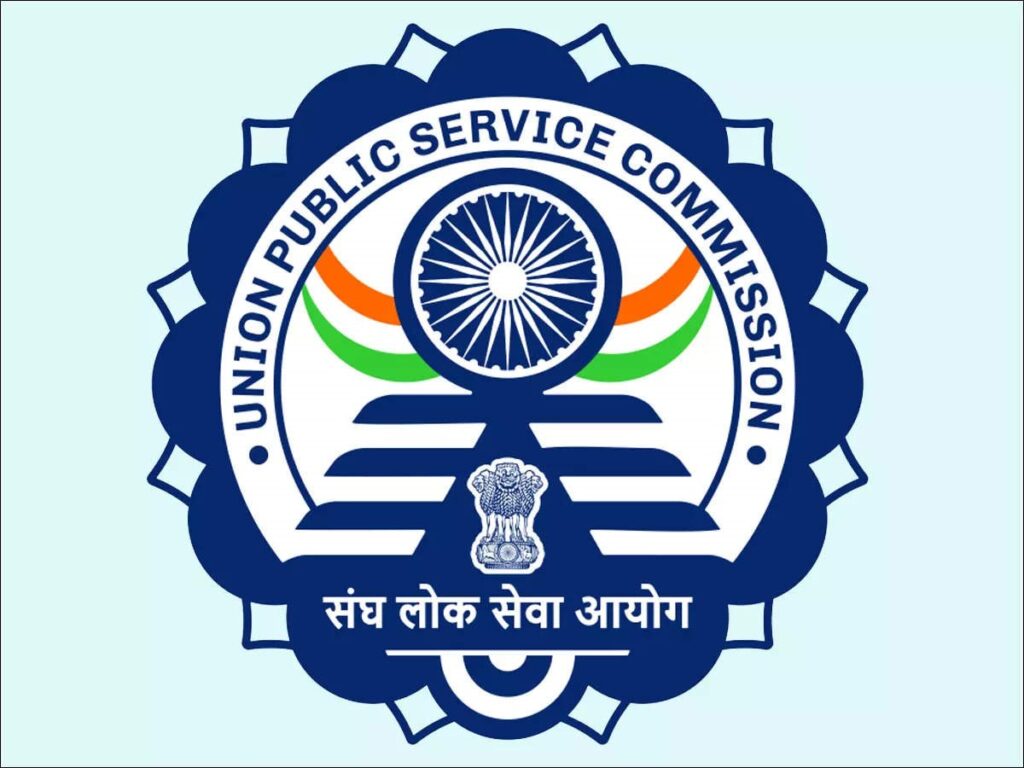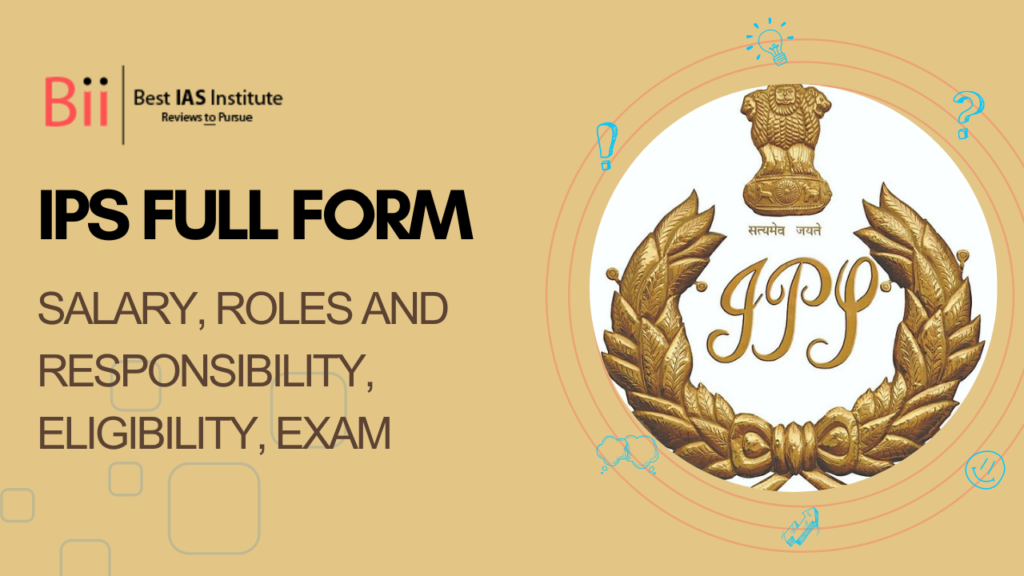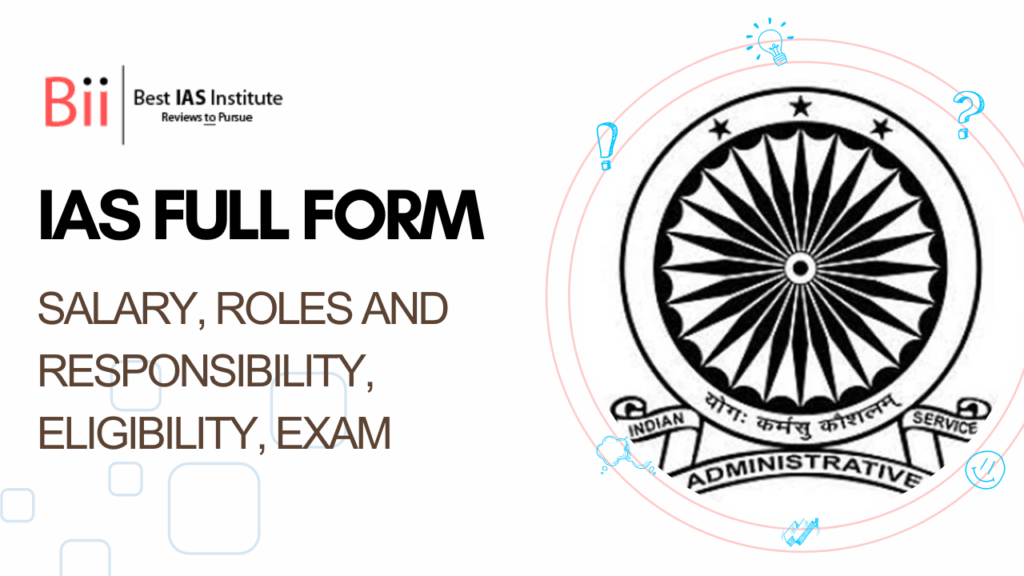
What is Police Full Form?
The POLICE full form is Public Officer for Legal Investigations & Criminal Emergencies and The essential role of police officers in maintaining law and order, investigating crimes, and ensuring safety of civilians. The Police are a group of workers whose job is to ensure everyone follows the law, prevent problems in the community, save lives, and ensure people are treated with equality.
In this article, we discuss Police full form, their roles and responsibilities of all Departments of Police.
| POLICE Full Form | |
| Full Form of POLICE | Public Officer for Legal Investigations and Criminal Emergencies |
| Role of POLICE | Maintain law and order, prevent and investigate crimes, ensure public safety. |
What is POLICE?
The POLICE Stands for Public Officer for Legal Investigations and Criminal Emergencies. It is constituted by the government to prevent crime, violence, any harmful act, etc. The Police are also responsible for the safety and the protection of public or civilians by enforcing law.
Roles of Police
Police officers play a vital role in responding to emergencies, preventing investigations, and promoting a sense of safety across public and society;
Following are some Roles and Responsibility of Police;
- Police responsible for Maintaining Law and Order: The Police officers responsible for enforcing laws, preventing crime, and maintaining order and safety.
- Police responsible for Crime Investigation: The Police requires to investigate the crimes, gather evidence, interview witnesses, and suspects.
- Community Policing: The Police departments engage in community policing, which involves building relationships with community members to address local concerns and prevent crime.
- They are responsible for Traffic Control: The Police officers enforce traffic laws, investigate accidents, and ensure road safety of civilians.
- Emergency : The Police responsible for emergencies such as accidents, natural disasters, and other incidents where civilians safety is at risk.
- Public Assistance: The Police Provide assistance to the public, including helping lost individuals, and providing information.
- Crime Prevention: The Police responsible to Identify potential crime risks, implement preventive measures, and educate about safety precautions to all civilians.
- Protecting Crime Scenes: The Police Secure and preserve crime scenes to ensure the integrity of evidence for investigations across the country/state/place.
- Testifying in Court: The Police requires to prepare and present evidence in court cases as witnesses to support prosecution till the court is resumed.
- Crisis Intervention: The Police is responsible to handle situations involving mental health crises, and other emergencies with sensitivity.
List of Major Police Departments
| Post / Role | DESCRIPTION |
| ACP (Assistant Commissioner of Police) | specific areas or divisions within a police district or city. |
| ASI (Assistant Sub-Inspector) | law enforcement and maintaining public order. |
| ASP (Assistant Superintendent of Police) | responsible for supervising police stations, managing operations, and ensuring law enforcement within their jurisdiction. |
| BSF (Border Security Force) | India’s borders and preventing unauthorised cross-border activities. |
| CBI (Central Bureau of Investigation) | complex and high-profile criminal cases. |
| CID (Criminal Investigation Department) | serious crimes and gathering intelligence. |
| CISF (Central Industrial Security Force) | installations, infrastructure, and public sectors, including airports, seaports, and industries. |
| CRPF (Central Reserve Police Force) | maintaining internal security, counterinsurgency, and disaster management. |
| DCP (Deputy Commissioner of Police) | multiple police stations and managing law enforcement activities within a district or city. |
| DGP (Director General of Police) | overall administration and policy implementation. |
| DIG (Deputy Inspector General) | the law and order situation within a designated region or zone. |
| DSP (Deputy Superintendent of Police) | law enforcement activities, investigations, and maintaining public order. |
| FIR (First Information Report) | initiating the investigation process for a reported crime. |
| IG (Indian Police Service) | senior leadership roles within state police and law enforcement agencies. |
| PI (Police Inspector) | investigations, managing cases, and ensuring law enforcement. |
| PSC (Public Service Commission ) | PSC conducts recruitment exams |
| SI (Sub-Inspector) | investigations, maintaining public order, and managing law enforcement activities. |
| SP (Superintendent of Police) | law enforcement activities, managing police stations, and maintaining public order within a district. |
| SSP (Senior Superintendent of Police) | law enforcement and administration within a district or city. |
How to become a Police Officer?
To become police officers, students must appear for recruitment examinations like SSC CPO, State Police Constable, and other government service exams conducted in India.
Following are some eligibility criteria for respective exams given below ;
- Nationality– Citizens of the state in which they are applying to join the military are typically necessary and for non-citizens or long-term residents to serve, some nations may have unique rules.
- Age– The minimum age between 17 to 18 years old, with parental consent in some cases and maximum age limit can vary but is generally around 35 to 40 years old.
- Medical Standards– Candidates must meet certain medical requirements to ensure they are fit for police service which includes passing a medical examination that assesses overall health, vision, hearing, and other specific criteria.
Government Police Exams in India
| Exams | Information |
| UPSC CSE Exam – Indian Police Service (IPS) | The UPSC CSE is the most prestigious police exam in India and is used to select candidates for the Indian Police Service (IPS) and the exam consists of three stages: 1- Preliminary exam,2- Mains exam 3- interview. |
| SSC GD Exam | candidates are selected for the position of General Service Constable in the Central Army (CAPF) and exam consists of a written exam and an aptitude test |
| SSC CPO Exam | Candidates for the post of constable in the Delhi Police and other state police forces and the exam consists of a written exam, a physical fitness test, and an interview examination. |
| Head Constable (Ministerial) | Conducted for the recruitment of head constables in the ministerial cadre and selection process includes a written examination, physical measurement, typing test & medical examination. |
Meaning of Stars on Shoulder in Police
- Assistant Superintendent of Police (ASP): ASP have one or two stars on their insignia.
- Deputy Superintendent of Police (DSP): DSP have one or two stars on their insignia.
- Superintendent of Police (SP) / Senior Superintendent of Police (SSP): SP and SSP have three stars on their insignia.
- Deputy Inspector General (DIG): DIG have three stars along with additional embellishments or symbols.
- Inspector General (IG): IG have three stars on their shoulder insignia, accompanied by other distinctive elements.
- Additional Director General (ADG): ADG having three stars along with other specific symbols that signify their higher position.
- Director General of Police (DGP): DGP have three stars on their shoulder insignia, often accompanied by other design elements that distinguish leadership role.
- Assistant Sub-Inspector (ASI) and Sub-Inspector (SI): ASI and SI have one to three chevrons ,V-shaped symbols on their shoulder insignia.
Salary of Police Officer
Salary of Police officers depending on some important factors such as location, rank, and experience.
In India, the average initial salary for a police officer ranges from INR 2-3 LPA. However, with experience, exposure, and updated skills, one can expect the salary to gradually increase over time and experience with maximum INR 6-7 LPA.
| Ranks | Pay |
| Constable | INR 2.5 lakhs – 3 lakhs per year |
| Head Constable | INR 3 lakhs – 4 lakhs per year |
| Inspector | INR 4 lakhs – 5 lakhs per year |
| Assistant Commissioner of Police | INR 5 lakhs – 6 lakhs per year |
Conclusion
A Police full form is Public Officer for Legal Investigations & Criminal Emergencies. The Police Officer is responsible for protecting lives, and property, preventing crimes, order while safeguarding citizen and an individual in a career as a Police Officer is not only responsible for protecting the lives of the people but also for investigating crimes, solving the problems in the country, and maintaining law and order because in police department there is a group of workers whose job is to ensure everyone follows the law, prevent problems in the community, save lives, and ensure people are treated with equality and justice.



